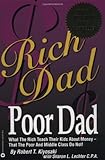Rich Dad, Poor Dad: What the Rich Teach Their Kids about Money That the Poor and the Middle Class Do Not
Personal finance author and lecturer Robert Kiyosaki developed his unique economic perspective through exposure to a pair of disparate influences: his own highly educated, but fiscally unstable father, and the multimillionaire eighth-grade dropout father of his closest friend. The lifelong monetary problems experienced by his “poor dad” (whose weekly paychecks, while respectable, were never quite sufficient to meet family needs) pounded home the counterpoint communicated by his “rich dad” (
List Price: £12.99
Price: [wpramaprice asin=”0446677450″]
[wpramareviews asin=”0446677450″]
Related Robert Kiyosaki Products




Interesting BUT be cautious,
When I found this book and read some of the reviews I thought WOW!!! But after reading it and doing some research on the internet I found that this writer (Kiyosaki) has been a bit of a shady character…do your own research via google or any other good search site.
The book has some fundamental truths about finance and the idea of becoming financially literate should be on every ones list. But there is no easy or quick way to become rich. When reading the book take a big pinch of salt as to the historical/factual truths he presents. It has some common sense ideas mixed in with conflicting fanciful tails of money making methods. In fact, the book is a bit mixed up around!
The book contains an Interesting bunch of ideas and thoughts, it may get your brain thinking about money, investment and assets but beyond that you gain nothing solid.
Anyway, read it if you wish but do your research and remember nothing is easy about making money…
Was this review helpful to you?

|Not so common sense,
In order to enjoy this book, you’d best put your “capitalist pig” head on. The first sixty pages assume that the best thing you can do from the age of nine is apply yourself to making money. Play baseball? Baseball is for wimps. It’s wasting precious time that you could be using applying your brain to thinking up money making schemes. It all started to irritate me, because there clearly is more to life than earning money – but then you wouldn’t really be buying this book without wanting to earn a bit more dosh, would you? I’m glad I stuck with it, however, as he does temper this attitude as the book progresses.
You cannot argue with one Kiyosaki’s opinions. Our (and the American) education system just does not teach you how to deal with personal finance. If it did, Barclaycard would be in receivership. Understand the value of a pound and make it work for you – it shouldn’t be such a distasteful subject. Kiyosaki offers some basic common sense approaches that you could apply in order to make your money work better, but he often qualifies advice by stating the approach may not be right for you. Therefore step one could be Learn to Understand Yourself and Your Motivations. Once you’ve done that, apply your mind to making money if it interests and excites you. If it doesn’t, fair enough. Perhaps the process will help you discover what actually does make you tick.
For those interested in making a stack, then the advice is again about learning. Choose who and what you learn from – teachers, friends, books, tapes, seminars. Look for new approaches. Find people who want to buy and sell something to them. Try to make your profit when you buy, not when you sell. Investigate stocks, real estate, whatever. Find people who can do a good job for you and reward them well. I especially liked his advice that you’ll only receive when you learn how to give, and as the book progressed Kiyosaki seemed to “lighten up” a bit more and came across a bit more human. In the later chapters he relates a lot more personal anecdotes and pithy tales about the upsides and downsides of trying to make money. It’s not all a bed of roses, but it shouldn’t be life or death either. Making money is just a challenge, and you should enjoy it. If you’re successful, you can reap the rewards, even if that’s choosing to donate it to other people or causes.
In summary, the book is an easy and likeable read. I’m sure most people will get something out it on their road to understanding. Will this book make you rich? Of course not. The only thing that will do that, as the book constantly reminds you, is you, your brain and the action you take.
Was this review helpful to you?

|A Trashy Book from Property Boom,
Sharon Lechter was introduced to Robert Kiyosaki by her husband, a patent lawyer. Koyosaki wanted to patent an educational game called “Cashflow” aimed at improving what he calls young peoples financial intelligence.
One thing leads to another and they eventually collaborated in producing this book which is essentially a financial biography of Kiyosaki. The Rich Dad, Poor Dad of the title are his real father, the superintendent of education for Hawaii (poor) and the businessman father of a schoolfriend (rich).
He says that at age 9 he decided to follow the advice of his rich dad and contrasts it with the advice of his poor dad throughout the book.
For example, poor dad says, “Love of money is the root of all evil”, but rich dad says, “The lack of money is the root of all evil” and he follows rich dad, making the money but proving that his poor dad was right on the moral aspects.
Rich dad says, “The rich don’t pay taxes, that’s only for the poor and middle class”, or Kiyosaki; “In real estate I make an offer with the words, “Subject to approval of my business partner” …… and if they accept the offer and I don’t want the deal I call my (non existent) business partner”
And rich dad again: He hugs a manageress in one of his shops and says that she is like a mother to him, then in the next breath gives a warning that “you’ll wind up like Mrs Martin”. He could have said that he respected her for her loyalty and good work but he clearly doesn’t.
If Kiyosaki had been aboard the Titanic you would have found him hiding behind the women and children in the first life raft, but in non critical situations he has some useful things to say about financial management.
His idea that an asset is only an asset if it makes you money is a good one. If you take a large mortgage to buy a private residence, then it is a drain on your resources, although an accountant would class it as an asset.
He’s also good on the importance of clear thinking. As he says, “Most people do not know that it is their emotions that are doing the thinking.”
The book is aimed at young people but should come with a double warning. Firstly that the writer is dishonest and secondly that the “less travelled road” of business ownership is very risky for less imaginative people than Kiyosaki.
A far better choice is Sam Walton’s “Made in America”. He was way ahead of Kiyosaki on ethics and financial success.
Was this review helpful to you?

|